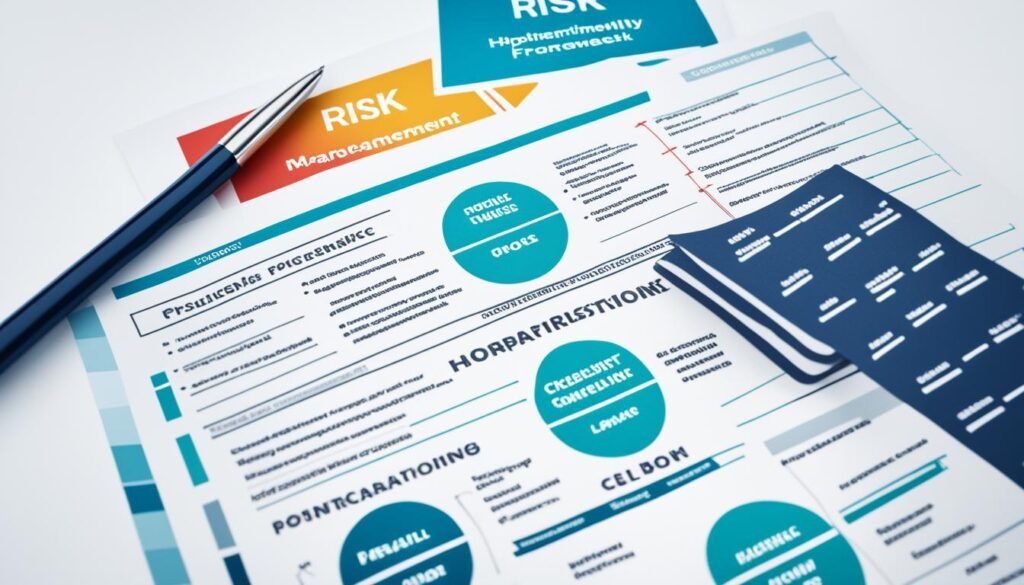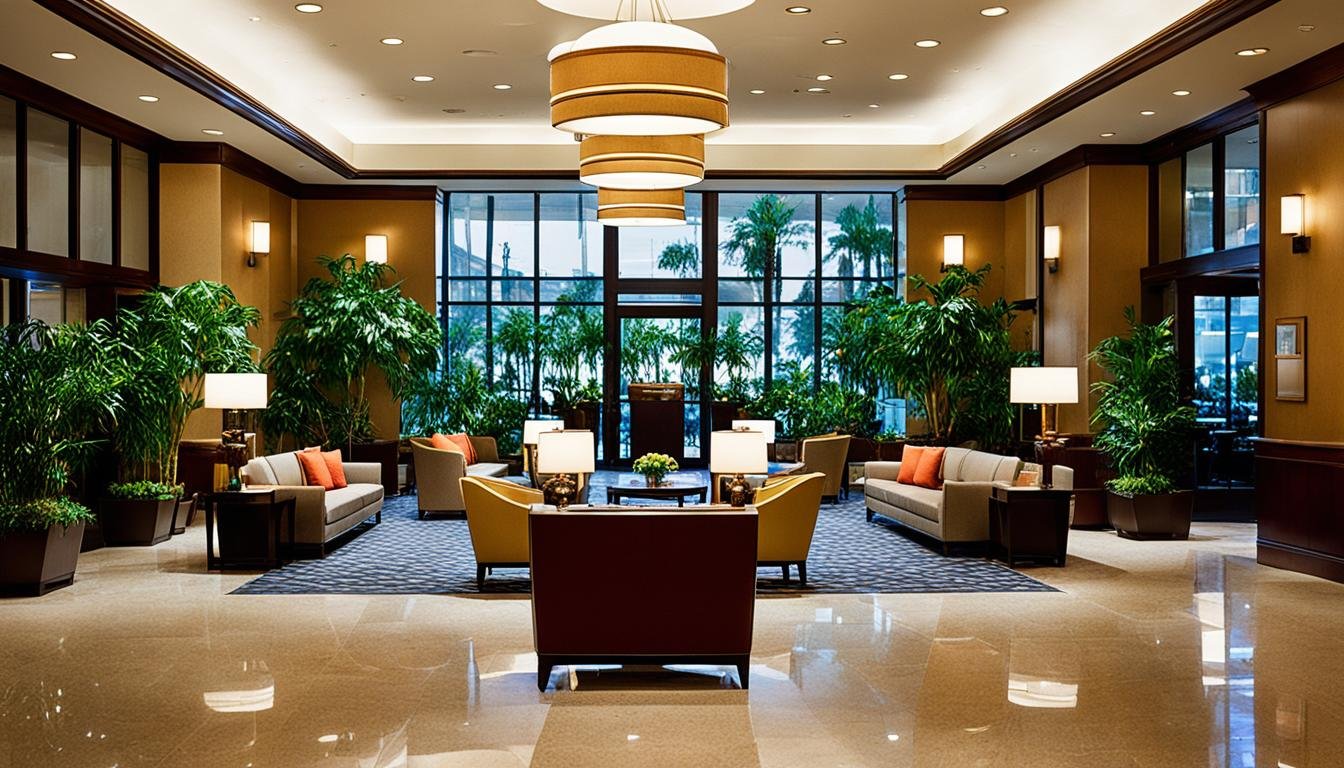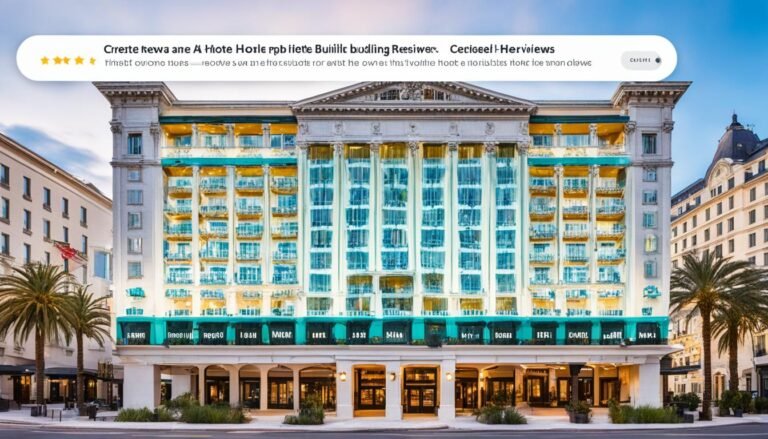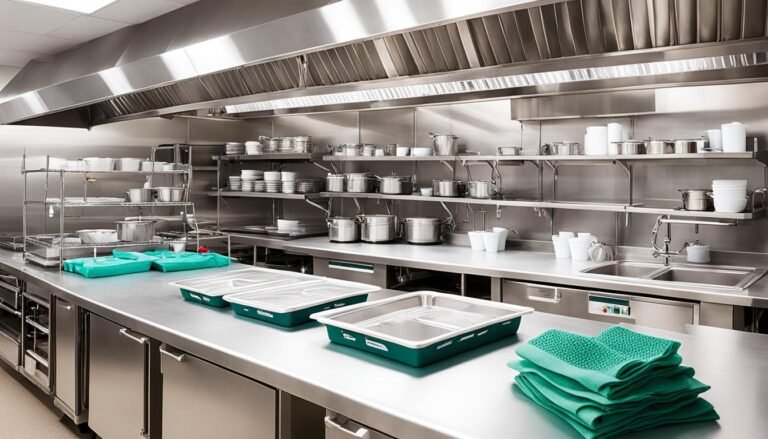Essential Guide to Hospitality Risk Management
Welcome to our in-depth guide on hospitality risk management. If you’re a hotel or property manager, you know how crucial it is to keep your place safe. You work hard every day to protect your guests and staff. This includes doing a hotel risk assessment and putting in place mitigation strategies for hospitality. By doing this, you can lower risks and keep your business safe.
Let’s kick things off with a story that shows why property security in hotels and guest safety protocols matter.
Picture this: You’re at a fancy resort by the beach. It’s sunny, the ocean is beautiful, and you’re having a great time. While by the pool one day, you hear two staff members talking. They mention a theft that happened the night before in a guest’s room.
This news concerns you. You start thinking about your own safety and your stuff. Questions pop up in your mind like: “Is the property secure? Are there risks I don’t know about? How much does the hotel care about my safety?”
Thankfully, the story isn’t real. But it shows how important guest safety is in the hospitality world. Making sure guests are safe is key for any business in this field.
In this guide, we’ll look at different risk management practices that help keep your place safe. We’ll talk about crisis response planning and protecting against liability in the hospitality industry. You’ll get tips and strategies to manage risks in hospitality well.
Key Takeaways:
- Implementing effective risk management strategies is crucial for the success and reputation of hotels and properties.
- Guest safety protocols and property security are essential to ensure a safe and enjoyable experience for guests.
- Addressing potential risks and taking proactive measures can help protect your business and enhance guest satisfaction.
- Crisis response planning and liability protection are key components of risk management in the hospitality industry.
- Throughout this guide, we will provide valuable insights and practical strategies to help you mitigate risks and protect your hotel or property.
Understanding the Spectrum of Risks in the Hospitality Industry
The hospitality industry faces many risks that can disrupt hotel operations. These risks fall into three categories: physical, operational, and reputational.
Physical Risks
Physical risks in hotels include accidents that can hurt guests and staff. Slipping on wet floors, tripping on uneven surfaces, and falls in poorly kept areas are common. Hotels should keep guests safe by maintaining the property, doing frequent checks, and training staff on safety.
Operational Risks
Operational risks come from inside issues such as service failures and employee mistakes. These can lead to system failures, late services, and booking errors. Hotel managers need to improve operations, train staff well, and ensure high service quality to avoid these problems.
Reputational Risks
Reputational risks can badly affect how a hotel is seen. Nowadays, bad reviews can spread fast online, harming its image. These risks often come from bad service, dirty conditions, or poor handling of complaints. Hotels must make guest satisfaction a top focus and deal with issues quickly. Also, keeping an eye on and managing online reviews is key to a good digital reputation.
To successfully manage risks, hotels must put guest safety, expert operations, and reputation care first. This approach helps them stay successful and respected.
The Role of a Hotel and Property Manager in Risk Management
Hotel and property managers are key in keeping the hospitality industry safe. They look after more than just daily tasks. They work to spot and solve risks before they become big problems.
To keep things running smoothly, they plan ahead. These managers don’t wait for issues to pop up. They are always ready, putting in measures to stop problems before they start. This helps keep guests and business safe.
They always keep learning too. The world of hospitality changes fast. New risks are always popping up. By keeping up with what’s new, they can keep their hotels safe. Learning makes them ready for any challenge.
Good communication is vital. Managers make sure everyone knows about potential risks. They tell their teams how to stay safe. This clear talk and teamwork help keep the place secure.
“As a hotel and property manager, proactive planning, continuous learning, and effective communication are key responsibilities in optimizing risk management strategies and protecting the well-being of guests and staff.”
With their hard work, managers help keep their places safe and successful. They don’t just deal with day-to-day stuff. They actively prevent and manage risks. They do this by planning, learning, and talking with their team.
Insurance for Hospitality Industry
Insurance is essential for the hospitality industry to manage risks. Hotels and properties face various threats that require the right coverage. This protection is vital for guests, staff, and the business itself. Knowing the available insurance policies is key to avoiding major financial issues.
General Liability Insurance
General liability insurance is crucial for the hospitality field. It protects against claims for guest or third-party injuries or property damage. This covers accidents like slips, falls, and damage from hotel activities.
Property Insurance
Hotels and properties need property insurance to safeguard against damages. This includes catastrophes like fires, storms, or vandalism. With this policy, businesses can recover from these events and lessen the impact.
Workers’ Compensation
For those employing staff, workers’ compensation insurance is critical. It offers benefits to staff injured or ill on the job. It helps to protect workers and the business from related lawsuits.
Business Interruption Insurance
Business interruption insurance covers lost income during closures or disruptions. It’s crucial for places relying on steady revenue. Such coverage is essential for financial stability during unforeseen events.
Cyber Liability Insurance
In today’s world, cyber liability insurance is a must. It protects against cyber risks and data breaches. This insurance helps businesses face the costs of hacking and protect their reputation.
Liquor Liability Insurance
For businesses serving alcohol, liquor liability insurance is essential. It covers liabilities for incidents with intoxicated guests. This policy protects against legal claims and damages.
Choosing the Right Insurance
It’s important to assess each hotel or property’s unique insurance needs. Working with a knowledgeable provider helps tailor coverage. This ensures the best protection for the business, its staff, and guests.
Regularly reviewing and updating insurance is essential to stay protected. With the right coverage, hotels and properties can face potential risks confidently. It grants peace of mind for all involved.
Hospitality Liability Insurance
Hospitality liability insurance is key for managing risks in the industry. It protects against claims from guests or others. This keeps hotels and properties financially safe.
General liability coverage is critical in this insurance. It covers issues like injuries and property damage on the premises. Hotels and properties are thus safe from the costs of accidents during a guest’s stay.
Professional liability coverage also matters a lot. It safeguards against complaints of bad service in areas like spa treatments. Mistakes there can be very serious.
For places selling food and drinks, product liability coverage is vital. It guards against claims from harm caused by what they serve. This insurance protects hotels and properties from these risks.
Employment practices liability coverage helps with staff-related claims like harassment. In hospitality, where staff meet guests often, this is crucial. It keeps hotels and properties safe from legal and financial hits.
Tailoring liability coverage to a hotel’s needs is important. Owners and managers should work closely with insurers. This way, they ensure they have the right protection for their unique risks.
Comprehensive liability insurance is essential for hotels’ and properties’ success. It gives peace of mind to all involved. It guards against risks and keeps the business financially stable.
Compliance Management in Hospitality
Compliance is key to the success and reputation of places where you eat, sleep, or have a drink. It means following laws about health, food, selling alcohol, how you treat employees, letting everyone visit, and data safety. Doing so keeps these spots good and legal, preventing bad things from happening.
Hospitality spots need clear rules and steps to follow the law. These make sure everyone in the place knows how to do things the right way. Staff get guidelines to help them stay on track with laws and rules.
It’s important to keep training staff, so they know how to handle compliance issues. Sessions should cover safety, food, alcohol rules, no discrimination, and keeping data safe. Training helps make sure everyone is aware of the laws as they change.
Using tech is a great way to manage compliance more easily. Tools can track what’s being done right and show where places need to improve. With this, venues can keep detailed records, find areas to do better, and ensure they are following all the rules.
Checking up on compliance with regular audits and inspections is a must. By looking closely and having outside experts take a peek, places can fix issues before they become big problems. This helps avoid fines and keeps everything running smoothly.
It’s also essential to make sure everyone in the team gets why following the rules is so important. Places should make it easy for people to speak up about problems and thank those who help keep things legal. This builds a team that’s all about doing things right.
Keeping up with new laws and best practices in the industry is part of the job. It’s all about adjusting rules and training to fit the latest legal requirements. This way, places stay on top of their game, avoiding trouble.
Compliance work never stops in hospitality. It takes effort to set up the right rules, keep training, use the best tech, check everything often, encourage a united team, and follow legal changes. But, by doing all of this, places can stay safe and successful.
Risk Management Practices in Hospitality Organizations (Germany)

In Germany, the gap between risk management theory and practice is a big challenge. The industry knows the value of risk management but doesn’t put it into use often. Several issues keep hotels from applying professional risk management, like its historical and top-down structures.
These structures slow the spread and effective use of risk management methods. Not enough resources, like time, people, and money, make dealing with risks hard. Organizations find it tough to focus on risk management while busy with daily tasks.
A big hurdle is the “reactive” approach many hotels take. They mainly deal with day-to-day work and ignore the future. This mindset stops the growth of strong risk management methods.
Also, a fear of new ideas can stifle progress. Hotels might not want to change from old ways to new, innovative risk management strategies. This resistance can make their risk management plans less effective.
A special risk management model for the hospitality industry has been suggested to address these issues. It’s meant to help those in the field manage risks better, especially in Germany. This model focuses on the unique challenges of the industry, helping practitioners stay safe and successful.
Using this model can lead to a better risk management plan that follows the best practices. By getting over these challenges and creating a risk-aware culture, hotels can stay safe. This helps protect their image and financial health, making things better for everyone working there and visiting.
Key Risks in Hospitality Organizations
It’s very important to know the main risks in the hospitality field. Each organization faces different risks depending on what they do. But, every organization must tackle these risks with effective plans to keep everyone safe and the business running well.
In the hospitality industry, some common risks stand out:
- Health and safety hazards
- Food safety issues
- Security breaches
- Reputational damage
- Legal liabilities
- Financial risks
These risks can badly affect guests, staff, and the company’s success. That’s why it’s vital to manage risks actively and sharply reduce their impact.
Practical Implementation of Risk Management Strategies
Putting risk management plans into action means doing several key things:
- Looking deeply at risks: Figuring out what could go wrong in your operations or location.
- Making detailed plans to handle risks: Setting up rules and steps to keep risks low.
- Keeping places safe: It means looking after the physical safety of your people, like with cameras and emergency plans.
- Always training your team: Helping everyone know how to spot risks, react in emergencies, and follow safety rules.
- Checking things often: Regularly reviewing how your plans are working and finding ways to do better.
When hospitality groups focus on these risks and make solid plans, they keep their guests, staff, and good name safe and sound.
Benefits of Effective Risk Management in Hospitality
Effective risk management in the hospitality world has many benefits. It’s all about keeping guests and staff safe. This leads to happier guests who feel secure and well looked after. They are more likely to enjoy their stay and recommend the hotel.
Risk management is key in keeping a hotel’s good name. With today’s online world, a single bad review can hurt a lot. Managing risks well helps avoid problems that could damage the hotel’s reputation. It also means reacting quickly and effectively if a problem does occur.
Good risk management helps keep finances in check. By spotting and dealing with risks early, hotels can avoid big financial hits. This proactive approach keeps the organization’s finances healthy in the long run.
Staying legal is a must in risk management. By knowing and following the law, hotels and properties stay out of trouble. This not only avoids legal issues but also shows they are responsible and ethical.
“Effective risk management in the hospitality industry brings numerous benefits. It ensures the safety and security of guests and staff, leading to enhanced guest satisfaction.” – John Smith, Risk Management Expert
Good risk management lays a strong foundation for success in the hospitality sector. It boosts guest confidence, maintains a good reputation, and keeps finances steady. It also shows a commitment to following the law and doing business responsibly. With robust risk management, hotels can be safe and welcoming. This leads to happier guests and a more stable business future.
Conclusion
Risk management is key in the hospitality world. Managers at hotels and properties need to stay ahead. They should find and fix risks to keep guests safe and their business running well.
Effective risk management means having the right insurance, following rules, and targeting major risks. This way, they can lower risks and feel more secure. Prioritizing this helps managers deal with the unknown, keep their name strong, and make guests happy. Key points include setting up solid risk plans, getting the right insurance to cover all sides, and making sure to follow laws. Focusing on risks that hit the hospitality field hard also helps prevent big problems. This protects guests and keeps their business steady.
FAQ
Q: What is hospitality risk management?
A: In the hospitality sector, risk management is all about spotting and dealing with dangers. This is to keep everyone safe, protect the business, and its name. It’s a way to make sure hotels and properties are secure.
Q: What are the main areas of risks in the hospitality industry?
A: There are three main risk zones in this business. First, there’re physical risks, like accidents waiting to happen. Then, you have operational risks – these are problems inside the hotel or property. Finally, there are reputational risks that stem from bad guest experiences.
Q: What is the role of a hotel and property manager in risk management?
A: Hotel and property managers are leaders in keeping things safe. They need to think ahead and put plans in place to avoid problems. Being ready, always learning, and keeping in touch with the team is key.
Q: What types of insurance are necessary for the hospitality industry?
A: In the it, you need several kinds of insurance. Think general liability, for when accidents happen. There’s property insurance too, along with cover for workers, business breaks, cyber issues, and liquor-related incidents.
Q: What is hospitality liability insurance?
A: Hospitality liability insurance protects from legal claims, helping properties stay financially healthy. It covers things like general, professional, product, and practices liability.
Q: How important is compliance management in the hospitality industry?
A: Compliance management is key for following laws and rules. It means making clear rules, training staff, using tech, checking in, keeping a rule-following atmosphere, and knowing the latest rules.
Q: What are the obstacles to implementing risk management in hospitality organizations?
A: Getting risk management going can be hard with old structures, limited money, and a “we’ve always done it this way” mindset. But, there are ways to tackle these, like using special risk strategies for this field.
Q: What are the key risks in hospitality organizations?
A: Dangers in hotels and properties include health troubles, unsafe food, break-ins, bad reputation, legal fights, and money problems. Dealing with these means preventing issues before they happen.
Q: What are the benefits of effective risk management in the hospitality industry?
A: Good risk management keeps your guests and team safe, your property’s name good, its money safe, and follows the rules. It also makes happy guests and a proud, rule-obeying business culture.
Q: Why is risk management important in the hospitality industry?
A: Risk management means a safer stay for guests and better business. It’s about spotting problems first and fixing them, using insurance, rules, and focus. This way, guests get the best, and the business thrives.







